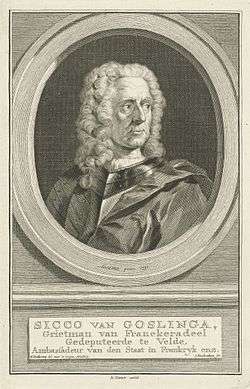Sicco van Goslinga

Sicco van Goslinga (Herbaijum, Friesland, 1664—Dongjum, October 12, 1731) was a Dutch statesman and diplomat, who served as gedeputeerde te velde (deputy-in-the-field, a kind of political commissar) of the States-General of the Dutch Republic with John Churchill, 1st Duke of Marlborough during his campaigns in Flanders in the War of the Spanish Succession. His memoirs form an important source of information for historians of the period.
Biography
Family life
Goslinga married Jeanette (Joanne) Isabelle baroness thoe Schwartzenberg und Hohenlansberg, vrijvrouwe of Ameland, at Ballum, Friesland, on June 12, 1692. They had five daughters, one of whom, Anna Dodonea, would marry Unico Wilhelm van Wassenaer.
Career
After studies at the University of Franeker and the University of Utrecht he became Grietman of Franekeradeel in 1688, a function he would hold until his death. This made him a regent and put him in line for all kinds of functions on a provincial level in the province of Friesland. He also represented that province in the States-General and in the Raad van State (Council of State) on many occasions (see "List of functions" in the External links).
As a member of the Council of State (which was the most important executive organ of the Republic in the military field, especially after the Second Stadtholderless Period had started) he became a gedeputeerde te velde for Friesland at the headquarters of the Duke of Marlborough from 1706 until the Duke's dismissal in 1711. As such he was charged with advising the Duke, and with keeping an eye on him, as agreed when Marlborough was made lieutenant-captain-general of the army of the Republic in 1702. The Dutch deputies-in-the-field had the right to veto the Duke's tactical decisions if they thought the interests of the Republic demanded it, and this had led to much friction with Marlborough in previous years. Goslinga, however, proved cooperative generally and managed to provide a positive contribution during the battles of Ramillies, Oudenaarde, and Malplaquet.
Though not a general, he was authorized to give orders to Dutch commanders at these battles. At the Battle of Oudenaarde he took it upon himself to throw a Dutch division into battle at a decisive moment.[1] Another incident had him personally ordering up reinforcements at the battle of Malplaquet, when the second Dutch assault on the left flank faltered.[2] To illustrate the good rapport between the Duke and Goslinga, Churchill mentions the anecdote in which they shared the Duke's cloak to sleep on after the battle of Ramillies.[3] Though Churchill has no high opinion of Goslinga's military abilities[4] he nevertheless extensively used his memoirs as a source.
Goslinga served as plenipotentiary for the Republic at the peace negotiations, leading up to the Treaty of Utrecht (1713). After the conclusion of the peace he served as extraordinary envoy of the Republic to the court of Louis XIV of France in 1714 and 1715. In 1728 he represented the Republic at the congress of Soissons about outstanding European diplomatic issues (like the status of Gibraltar).
Until his death he was involved in Dutch politics. He supported the appointment of William IV, Prince of Orange as stadtholder of Groningen in 1719.
Works
- Goslinga, S. van (1857) Mémoires relatifs à la Guerre de succession de 1706-1709 et 1711, de Sicco van Goslinga, publiés par mm. U. A. Evertsz et G. H. M. Delprat, au nom de la Société d’histoire, d’archéologie et de linquistique de Frise, (Published by G.T.N. Suringar, 1857)
- Goslinga, S. van, Slingelandt, S. van, Rappard, W.A. van (ed.) (1978) Briefwisseling Tussen Simon Van Slingelandt En Sicco Van Goslinga 1697-1731, ISBN 90-247-2167-9 ISBN 9789024721672
References
Sources
- Churchill, W.S. (2002) Marlborough: His Life and Times, University of Chicago Press, ISBN 0-226-10635-7, ISBN 978-0-226-10635-9
- Frey, L. and M. (1995) The Treaties of the War of the Spanish Succession: An Historical and Critical Dictionary, Greenwood Publishing Group, ISBN 0-313-27884-9, ISBN 978-0-313-27884-6, p. 189
- (in Dutch) Vries, O. (1999) De Heeren Van Den Raede: biografieën en groepsportret van de raadsheren van het Hof van Friesland (1499-1811), Uitgeverij Verloren, ISBN 90-6550-076-6, ISBN 978-90-6550-076-2, p. 347
External links
- (in Dutch) Listing of official functions